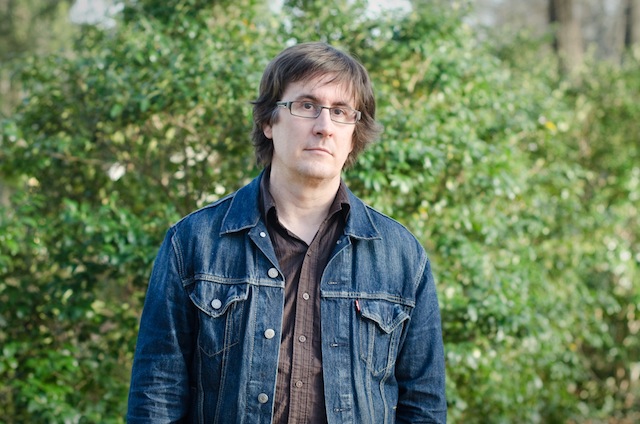Mountain Goats' John Darnielle Rocked Lincoln Hall ... With Conversation
By Jaclyn Bauer in Arts & Entertainment on Oct 9, 2014 9:00PM

John Darnielle, photo by Lalitree Darnielle
John Darnielle appeared at Lincoln Hall Tuesday night to promote his latest artistic work; a novel entitled Wolf in White Van. Hosted by Unabridged Bookstore, Darnielle read a passage from his novel in which he discusses the Larry Norman song 666 which, when supposedly played backward, eerily sings “wolf in white van” to listeners.
After reading from Wolf in White Van, Darnielle sat down for a conversation with Mairead Case, columnist for Bookslut and PhD candidate at University of Denver. Case drew from Darnielle information about the development of his novel, his writing process and more.
Wolf in White Van is a novel told in reverse, but Darnielle revealed that he wrote the last chapter of novel first. In fact, at its inception the book was a collection of different perspectives and not really linear at all. When Darnielle decided that he wanted to tell the story backwards (incidentally directly related to the title, which he chose before deciding to want to write a reverse narrative) he literally cut up his manuscript and started moving pieces around.
Case further pressed Darnielle about his writing process, focusing particularly on his experiences as a songwriter and how those compare or inform his work as a prose writer. Darnielle laughed at his own songwriter instinct to create a “punch every three minutes,” realizing that this isn’t generally good writing. Darnielle explained that he often has to “get out of the way of the story” when he’s writing.
In terms of his plotting and prewriting, Darnielle only makes short notes and then actually writes his content as “improvisation.” He admits that he is happiest when he’s doing something close to performing, and when it comes to writing prose, improv is that closest thing.
Darnielle also discussed favorite writers, half joking that authors such as Joan Didion, Ernest Hemingway and Charles Bukowski are so influential that young writers shouldn’t read them. This is because Darnielle believes that young writers will be so influenced by such work that their work will no longer be their own, but rather strange imitations of their predecessors. Instead, Darnielle suggests taking points from these influential authors rather than borrowing writing styles. Didion, he notes, taught him “that you don’t have to tell the whole story. Your job is to conjure the feeling of it.”
When asked about why Darnielle tends to focus much of his creative work on adolescent main characters, he responded that he is “drawn to where [his own] trauma is.” He stressed though that time is often needed between a traumatic event and its retelling. He dug up the words of Wordsworth and stated that “powerful feelings... recollected in tranquility” have a greater effect than do word uttered in the throes of passion. You “can’t process it while you’re in the middle of it” Darnielle stated matter-of-factly. He likened the experience to trying to describe how you feel during sex while having sex, which if you did you wouldn’t be having sex anymore. Experiences, he claimed, are valid in their own right and are great for simply being experiences. However, “taking the time to reflect on things [offers] a truer expression of your feelings and who you are.”
If you haven’t yet had a chance to read Wolf in White Van, do so IMMEDIATELY!